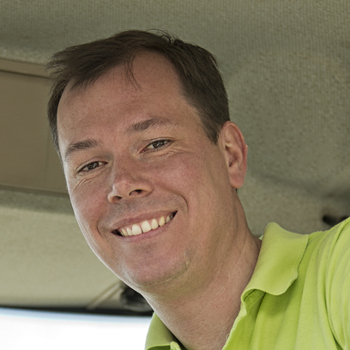Farming in the digital age
Robert HagemannOccupation:
Farmer
Position:
Managing Director of Hagemann Dienstleistungen GmbH in Groß Pankow

Occupation:
Farmer
Position:
Managing Director of Hagemann Dienstleistungen GmbH in Groß Pankow

The Brandenburg farmer Robert Hagemann always has his office with him, albeit on his smartphone. These and other digital assistants facilitate his work out in the fields, in the stables or at the biogas plant.
The profession of farming has a long tradition in Robert Hagemann’s family. Without the German reunification, however, it is unlikely that the native of Lower Saxony would have followed in the footsteps of his grandfather and father. In 1990, the family of the then 15-year-old Robert Hagemann moved to the region of Prignitz, where they established an agricultural business in Groß Pankow, far from his old home. “My father had always dreamed of having his own large company. But in Lower Saxony, we simply didn’t have the possibilities that we found here, in the former East Germany,” recalls the 41-year-old.
Sustainability pays off
In 1995, after training as an agronomist and with a master’s diploma in farm managing in his pocket, Robert Hagemann officially joined the family business. Since that time, he has been active as a partner of Hagemann Dienste GmbH in Groß Pankow, and under his leadership, the family business has developed into a role model for modern agriculture. From agriculture to pig farming, fodder production or the intricacies of a biogas plant: Robert Hagemann knows how to exploit modern technology in order to drive his business forward in a sustainable manner. He is convinced that “Sustainability is in everyone’s best interests. For our environment and also our wallets.”
Slurry and sun provide power and heat
When Hagemann originally joined the family business, the focus was predominantly on agriculture. In 1996, the company branched out to include pig fattening. Today, at the site in Kuhsdorf, up to 8,000 animals are fattened in air-conditioned and bright stables with plenty of space. Since 2012, their own-operated biogas plant supplies electricity and heat for the office and stables. Here, the slurry is automatically transported out of the stables for later processing in the biogas plant. “I produce electricity for 4,000 households with these 8,000 pigs, all because I no longer transport the slurry out to the fields but use it instead in the biogas plant. This saves a great deal of money and is a demonstration of how to make a sustainable closed loop economy work.” In turn, the feed for the animals also includes waste residues from food and beverage production. 80% of the energy required to heat the stables comes from the building’s own photovoltaic system.
Higher yields and improved working conditions
For Hagemann, digitisation and sustainability are the engines of the future. “Thanks to technological developments, the yields have increased six-fold over the past 100 years, and farmers’ working conditions have improved a lot. Modern harvesters and tractors have fittings that wouldn’t look out of place in a luxury car, and stables are no longer gloomy, but are bright and friendly, which benefits both the animals and the employees. The animal feeding and the mucking-out of stables is now automatic,” explains Hagemann.
Back in his grandfather’s time, such field work and animal husbandry was time-consuming and energy-sapping, and most farmers could only dream of regular working hours or proper holidays. “Digitisation has greatly improved our working conditions and quality of life. Now we have free time and even vacations,” confirms the father of four. Alongside reading and travel, the farmer loves nothing more than to go hunting, which helps provide balance to his work and responsibilities.
A smartphone to keep tabs on the fields and stables
Hagemann has his office with him at all times, and always has an overview of operations. Tables and graphs not only display the weight of the pigs, but also whether the fodder is being supplied as needed, the ripeness of the wheat and how effectively the biogas plant is operating. Aided by this technology, his employees are always online and are up to date with conditions on the fields, as well as in the stables and at the biogas plant.
In particular, satellite-based GPS systems have helped make field work more effective and convenient. “With the help of GPS, we are able to survey larger working widths. In earlier times, the driver was completely overloaded by this task, whereas today, the machine drives independently and the driver only needs to monitor the system.” This is possible because sensors can determine the height at which to cut the wheat, as well as where to apply fertiliser and the quantity that is required. When all is said and done, the sensors also provide a figure for the final crop yield.
More effective monitoring of processes
A digital map provides the combine harvester operator with information on his or her next tour of the field. This monitoring activity not only allows operators to focus on the essentials, but also saves time and resources: “I’m grateful that digitisation gives us the opportunity to better monitor our processes, cut costs and be more effective in general.”
Technology lends appeal to agriculture
According to Hagemann, agriculture is now more environmentally friendly than ever before, and as a result of digitisation, more attractive as an industry in which to work. Young women in particular are showing a greater interest in taking up the profession of farmer. For Hagemann, this is a positive indication that modern agriculture has a bright future. In his free time, the entrepreneur takes part in volunteer work for numerous regional and federal associations. “I want agriculture to still be playing a role in the Germany of the 22nd Century. People must recognise the need for and diversity of agriculture, and not always see the downsides. This is something that is genuinely close to my heart.”
Hagemann cannot predict whether his own sons will follow in the footsteps of their father. In any case, the 41-year-old is hoping to pass on his experience to the next generation. “As the son of a farmer, I am very aware that the resources of land, air and water are our sanctuary, and we must protect them. In this task, it’s important that we are not beholden exclusively to prevailing wisdom, but take a consistent and sustainable path.”


